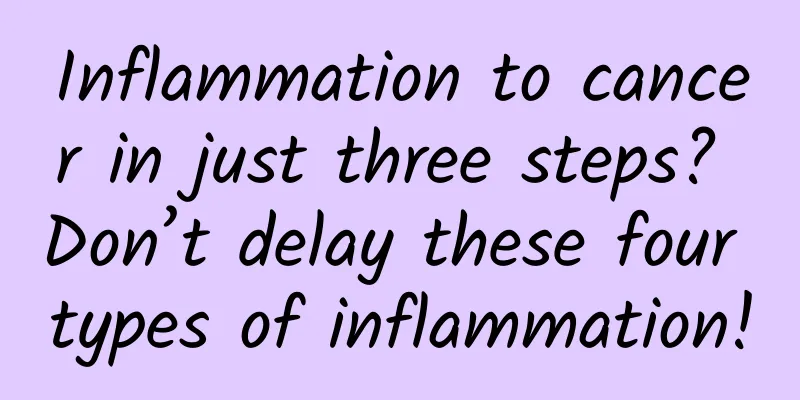Inflammation to cancer in just three steps? Don’t delay these four types of inflammation!

|
When many people find that they have inflammation during a physical examination, their first reaction is "it's inflammation, just take some anti-inflammatory medicine." But do you know that many cancers occur on the basis of chronic inflammation , so you must not take it lightly. Three steps from inflammation to cancer Step 1: Inflammation Inflammation is the body's natural response to injury or infection, acting like the body's "fire brigade" to help us clear out pathogens and damaged tissue. Short-term inflammation is beneficial, but acute inflammation can become chronic when the inflammatory response is ineffective in addressing the initial cause or when the body mistakenly perceives its own tissues as foreign threats. Zeqiao original copyright contact Step 2: Chronic Inflammation Chronic inflammation is like a "slow fire" in the body that can last for months or even years. This inflammation is not easy to detect, but it quietly destroys tissues in the body and leads to a decrease in immunity. Long-term chronic inflammation is associated with the development of many chronic diseases, including cardiovascular disease, diabetes, and even cancer. Step 3: Cancer Pathologist Rudolf Virchow once described cancer as an " inflammatory wound that does not heal ." His research revealed that under the continuous stimulation of chronic inflammation, cells may mutate, and these mutated cells may eventually turn into cancer cells. Zeqiao original copyright contact Don't delay treating four types of inflammation 1. Chronic hepatitis Chronic hepatitis, especially caused by hepatitis B or C virus, is one of the main risk factors for liver cancer. The virus continues to replicate in the liver, triggering a long-term inflammatory response, leading to liver cell damage and regeneration. During this process, the constant division and repair of liver cells may cause mutations, increasing the likelihood of cancer. Zeqiao original copyright contact 2. Chronic gastritis Chronic gastritis is often caused by Helicobacter pylori infection. The continued presence of this bacterium not only causes chronic inflammation, but may also lead to abnormal proliferation of gastric cells and then develop into gastric cancer. Studies have shown that people infected with Helicobacter pylori have a risk of gastric cancer many times higher than those who are not infected. 3. Ulcerative colitis Ulcerative colitis is characterized by persistent inflammation and ulcers in the colon. This long-term inflammatory state can lead to atypia in the intestinal wall cells, increasing the risk of colon cancer. 4. Chronic pancreatitis Long-term pancreatitis not only causes pain and digestive problems, but can also lead to continued inflammation and damage to pancreatic tissue. Repeated inflammation and repair processes may damage the genetic material of pancreatic cells and promote cancer. Three types of pro-inflammatory foods should be avoided 1. High-fat foods and fried foods High-fat foods can trigger a cellular stress response similar to viral infection, which can lead to systemic inflammation. It is recommended to limit the amount of oil used to 25-30 grams per day and eat less fried foods. 2. Red and processed meat Red meat (such as pork, lamb, beef ) and processed meat (such as ham, bacon, and smoked bacon ) produce a large amount of ferrous ions and N-nitroso compounds during the digestion process, which will initiate the process of cell cancer if inflammation persists. Therefore, it is recommended to consume red meat and processed meat no more than 1-2 times a week, no more than 120 grams each time, and choose fresh meat. 3. High-sugar and high-starch carbohydrate foods Blood sugar rises quickly after eating high-sugar and high-starch foods. High blood sugar levels can easily promote the growth of bacteria and viruses, and at the same time trigger the release of insulin and adrenaline, leading to an increase in inflammatory factors in the body and aggravating the inflammatory response. Zeqiao original copyright contact Therefore, you should reduce the intake of foods such as steamed bread, white rice, cakes, biscuits, etc. , and choose foods with low GI (glycemic index). Eat more anti-inflammatory foods 1. Whole grains: Whole grains are rich in dietary fiber, which can bind to carcinogens, absorb heterocyclic amines, and help reduce the levels of certain inflammatory cytokines. It is recommended to eat more whole grain foods such as brown rice, oats, and whole wheat bread . 2. Fish: You can regularly eat some fish such as salmon, sardines and mackerel that are rich in anti-inflammatory omega-3 fatty acids to help reduce inflammatory responses. 3. Fresh fruits and vegetables: This type of food has a medium microbial content and can reduce the systemic inflammatory index by regulating intestinal microbiota, reducing oxidative stress and activating immune cell pathways. 4. Tea: Tea is rich in tea polyphenols, which are a type of antioxidant and anti-inflammatory substance. Try to drink less alcohol and replace it with tea, especially green tea and white tea . |
<<: Can soda water really relieve stomach discomfort and play a role in "nourishing the stomach"?
>>: If the brain can't feel pain, why do headaches hurt?
Recommend
How many days does it take for an egg to form?
When the sperm enters the female body, it combine...
Basic principles of medication during lactation
During the lactation period, because you need to ...
Big belly like pregnant
The volume of a woman's belly changes greatly...
Is it normal to have your period two days early?
Girls' menstruation is regular and generally ...
Causes of an Immature Cervix
The cervix is an important part of the female r...
White blood cell two plus signs
Routine blood test is a basic test item in modern...
How to distinguish between amenorrhea and menopause
Women's menstrual periods will continue for d...
When is the right time to prune fuchsia? How to prune fuchsia to make it grow more vigorously?
Fuchsia is a common flower plant in life. It is t...
Can induced labor be performed if the placenta is low in the pregnancy?
Pregnancy is possible when the placenta is low, b...
What should I do if my ears are always itchy?
I believe that many people have encountered this ...
What are the classifications and treatment strategies for childhood lymphoma?
Lymphoma is a malignant tumor that originates fro...
Why do women fear cold?
People who are afraid of cold should take more su...
Vulvar pain during menstruation
Key reminder: In some cases, women will experienc...
How to clean the lower body after abortion?
Recently, many people have experienced unexpected...









